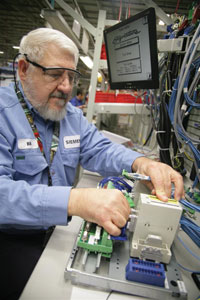Georgia is the ideal place to locate for businesses seeking success. Manufacturers of all sizes can take advantage of Georgia’s unique business assets, increasing value for their customers across the globe.
Infrastructure The state’s two deep-water ports in Brunswick and Savannah, plus Hartsfield-Jackson Atlanta International Airport, a strong interstate highway system and the most complete rail network in the Southeast make it easy for businesses to ship goods the world over.
The state’s two deep-water ports in Brunswick and Savannah, plus Hartsfield-Jackson Atlanta International Airport, a strong interstate highway system and the most complete rail network in the Southeast make it easy for businesses to ship goods the world over.
Reaching clients is simpler with Hartsfield-Jackson, the world’s busiest and most efficient passenger airport. Eighty percent of the U.S. market can be reached within a two-hour flight from Atlanta, which includes 150 nonstop domestic destinations. For international flights, the airport serves 95 direct destinations in 57 countries. In addition, Hartsfield-Jackson won the 2009 Airport of the Year award from Air Cargo Week magazine. The cargo handling areas provide convenient access to Interstates 75, 85, 285 and 20.
Atlanta is one of five U.S. cities with three cross-country interstates that intersect near downtown: Interstates 20, 75 and 85. Georgia’s 15 interstates consistently rank highly for their condition. The state’s central location means freight can reach 80 percent of U.S. markets within a two-day truck haul.
Georgia’s 4,700 miles of rail makes the state the best-connected in the Southeast. Two of the country’s largest Class 1 rail systems – CSX and Norfolk Southern – provide the majority of rail service. In addition, 24 short-line rail companies operate on almost 1,500 miles of tracks in Georgia, providing additional connectivity.
Georgia’s ports are gaining market share despite the current economic climate. The Port of Savannah is now the fourth busiest container terminal in the U.S. This growth is rooted in the Olympic Games. In 1996, as part of the preparations for the Summer Olympic Games, Atlanta was designated as the first U.S. Customs Inland Port. This designation made Atlanta a Foreign Trade Zone, allowing containers to travel inbound duty-free from coastal ports. Georgia’s ports are noted for their convenient intermodal connections, state-of-the-art cargo handling equipment and value-added services.
Incentives Georgia’s status as a pro-business environment is borne out by its strong array of incentives. The state was named the fifth best state to do business by Forbes in 2008, in part because of its outstanding incentives. Georgia offers a performance-based package of business assistance designed to foster success for companies as well as the communities where they locate.
Georgia’s status as a pro-business environment is borne out by its strong array of incentives. The state was named the fifth best state to do business by Forbes in 2008, in part because of its outstanding incentives. Georgia offers a performance-based package of business assistance designed to foster success for companies as well as the communities where they locate.
The state has one of the lowest corporate tax rates in the nation, at 6 percent, and the range of corporate tax credits help companies further reduce their tax burden. Georgia’s single factor corporate tax, job tax credits, existing industry and headquarters tax credits, and research and development incentives are available to corporations looking to establish a presence in Georgia.
In 2009 Georgia Governor Sonny Perdue signed an update of the state’s business incentives into law, making them easier for companies to use. Included in this legislation is the new Mega Tax Credit, intended for large economic development projects. NCR, the worldwide leader in ATMs, recently took advantage of the Mega Tax Credit to relocate its headquarters from Ohio to Georgia. The company is also locating a manufacturing facility and its customer service headquarters in Georgia. Other changes include improvements to the R&D tax credit and the new Quality Jobs tax credit, which rewards companies that pay higher-than-average wages.
Georgia has two types of tax exemptions: the sales and use tax exemption and the inventory tax exemption. These allow qualified equipment purchases and leases to be exempt from sales and use tax. In addition, more than 100 Georgia counties offer up to 100 percent exemptions for qualified raw material, work-in-process and finished goods under Georgia’s local-option “Freeport” law.
The state also has a variety of hiring, training and education assistance to help recruit and retain the right workforce for every company’s needs. Georgia’s Department of Labor assists companies in recruitment by posting job notices, collecting and screening applications, providing interview space, scheduling interviews and hosting job fairs.
The state’s Technical College System hosts the award-winning training program ‘Quick Start,’ the nation’s top customized workforce training, provided at no cost to employers. And Georgia’s HOPE Scholarship and Grant provides free tuition at the state’s public colleges, universities and technical schools for graduating high school seniors with a B average or higher.
Paths to Success Georgia is full of opportunity, and a growing, educated workforce means companies will be able to hire the staff they need to succeed. The state is number one in the U.S. for attracting the highly-educated 25-34 demographic, and its large university system means that more than 44,000 graduates each year enter the labor force.
Georgia is full of opportunity, and a growing, educated workforce means companies will be able to hire the staff they need to succeed. The state is number one in the U.S. for attracting the highly-educated 25-34 demographic, and its large university system means that more than 44,000 graduates each year enter the labor force.
Many of the world’s leading companies are headquartered in Georgia. Some, such as AFLAC, The Coca-Cola Company and The Home Depot, grew from the ideas of visionary Georgians. Others, such as UPS, Delta Air Lines, Newell Rubbermaid and NCR, found that only Georgia delivered the mix of business culture, work force, resources and quality of life that allows them to thrive.
In 2006, major Korean automaker Kia Motors decided to build its first U.S. manufacturing facility in Georgia. Since then, many automotive supplier companies, including Hyundai Mobis, Dongwon Autopart Technology, Glovis, Kumho Tire, Johnson Controls, Sewon America Inc., Sejong Georgia and DAEHAN Solution have chosen to locate in Georgia. Advanced manufacturing is one of the state’s strategic industries, and with Georgia’s compelling business assets, the sector continues to thrive.
Being in Georgia makes it easy to stay connected to business communities around the world. More than 60 countries have consular, trade or bi-national chambers of commerce offices here, and the state is home to more than 2,500 internationally-owned facilities representing at least 53 countries. Georgia’s 10 international offices, including the newest in Beijing, assist companies in finding new markets for their products. And the addition of the state’s first International Business Concierge means that international executives now have a seasoned professional smoothing the way to locating in Georgia.
 Once a company makes a business decision to become part of Georgia, the relationship continues. Regional staffers keep companies apprised of new incentives and programs in order to facilitate growth and help locate new facilities for expansion, and the state’s international staff will help companies explore opportunities to export products and services.
Once a company makes a business decision to become part of Georgia, the relationship continues. Regional staffers keep companies apprised of new incentives and programs in order to facilitate growth and help locate new facilities for expansion, and the state’s international staff will help companies explore opportunities to export products and services.
Georgia’s outstanding quality of life makes doing business a pleasure and gives its companies, including 14 on the Fortune 500 list, a distinct advantage in attracting and keeping quality employees. The state boasts one of the lowest costs of living in the United States. Four distinct seasons, mild winters, beautiful coast and mountains and great cultural destinations offer a quality of life not found elsewhere. This is just part of the reason why each year, thousands make Georgia their new home. The state’s abundant resources, dynamic business climate and innovative economy help companies transform their visions into reality.

